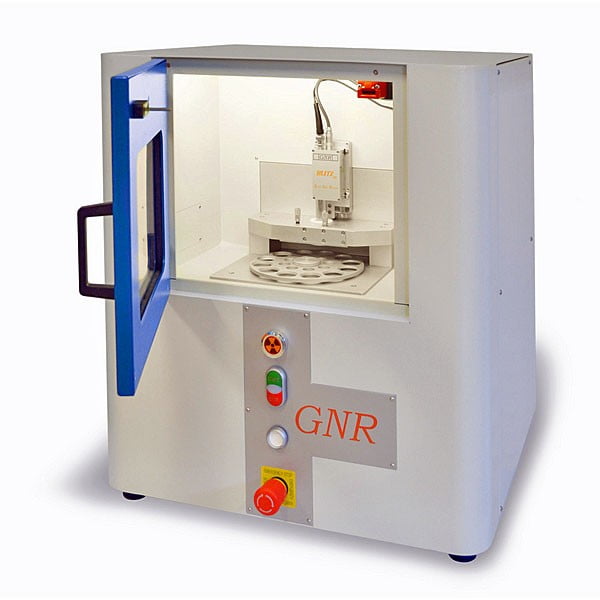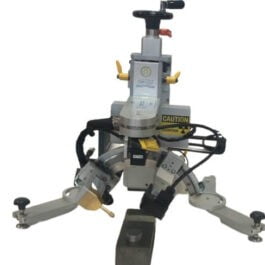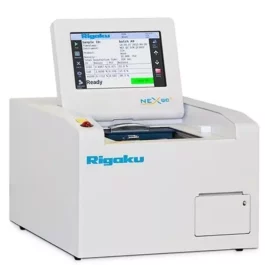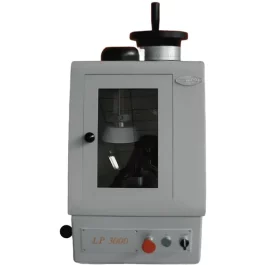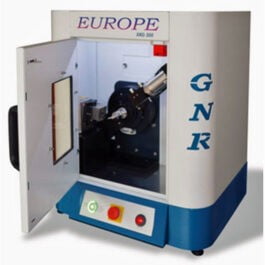Benchtop EDXRF – Horizon
GNR Benchtop TXRF Analyzer Horizon
Horizon is Benchtop EDXRF Spectrometer (TXRF) for multi elemental qualitative and quantitative analyses for major constituents and ultra-trace in suspension as well as liquid samples.
- Simultaneous multi-element analysis from Na to Pu
- Confirms to ISO/TS 18507:2015, ISO 20289:2018
- No matrix effect
- No matrix-dependent calibration curves
- Improved detection limits (LOD) down to ng/g or lower
- Minimum amount of sample
- Microanalysis capabilities
Horizon Benchtop EDXRF Spectrometer components are mounted in a steel cabin shielded in accordance with international X-ray safety rules, and equipped with lead glass windows, flushing lamps, and safety interlocks.
TXRF is a type of Energy Dispersive X-Ray Fluorescence (EDXRF) in which the X-Ray beam strikes the sample deposited as a thin layer on a carrier at a very small incident angle in order to exploit the excitation enhancement given by the total reflection effect. As far as the sample is thin enough (thin film approximation) the technique’s main strengths are:
- No matrix effects
- Simple quantification using internal standard
- Calibration and quantification independent of any
- sample matrix
- Simultaneous multi-element ultra-trace analysis
- Minimal quantity of sample required for the measurement (5μl)
- Excellent detection limits (ppt or pg)
- Excellent dynamic range from ppt to percent
- Easy sample preparation
- Possibility to analyze the sample directly without chemical pre-treatment
- No memory effects
- Low running costs
Safe and easy to use Horizon is a state of the art of Total Reflection X-Ray Fluorescence spectrometer delivered with the most advanced technical components which provides great accuracy and precise results.
It is a powerful tool for trace analysis at an affordable price.
| X-Ray Generator | |
| Maximum Output Power | 600 W |
| Max Output Voltage | 40 kV |
| Max Output Current | 15 mA |
| X-Ray Tube (*) | |
| Type | Glass, Mo anode, fine focus |
| Focus | 0.4 x 8 mm |
| Max Output | 600 W (factory maximum: 2.0 kW) |
| (*) different anodes can be mounted on request | |
| Multilayer monochromator | |
| Type | W/Si |
| Reflectivity | 80% |
| Excitation energy | |
| Mo-Ka | 17.44 keV (DE<1 KeV) |
| Sample Holder | 12 position sample holder |
| Detector | |
| Type | Peltier-cooled Silicon Drift Decoder (SDD) |
| Active Area | 30 mm2 (other size available) |
| Resolution | <133 eV (@Mn-Ka, 1 ms peaking time) |
| Atmoshere | Air or He flux |
| Case | |
| Dimensions | Windth 578.5 mm, Height 788.5, Depth 555 mm |
| Leakage X-Rays | < 1 mSv/year (full safety shielding according to the international guidelines) |
| Cooling | External Chiller (650 (h), 377 (w), 521 (d)) |
| Software | |
| Acquisition | Measurement batch setup |
| Detector parameter settings | |
| Analysis | Automatic Least Square Marquardt fit procedure for background determination and peak area calculation |
| Automatic / Manual search Function | |
| Energy calibration refinement | |
| Quantification via an internal standard using theoretical and /or experimental sensitivity curves for total reflection | |
| Possibility of using different sensitivity curves, e.g. sample dependent | |
| Analysis report generation |
Acquisition Software
Windows software designed to control Explorer includes features like the batch programming for a set of measurements. The program can control different kinds of detectors and devices attached to the instrument. Control panels for scintillation, linear position sensitive detectors and XRF X-GLAB SDD detector are integrated.
Analytical Software
- Least square Marquardt fit procedure for the area calculation (spectral analysis)
- Automatic/manual search function
- Manual or automatic calibration of energy
- Quantification via an internal standard using theoretical and experimental sensibility curves for total reflection
- Environmental Analysis: water, dust, sediments, aerosol (ISO/TS 18507:2015, ISO 20289:2018)
- Medical/Pharma: toxic elements in biological fluids, tissue samples and catalyst residues
- Forensic Science: analysis of extremely small sample of quantities
- Pure chemicals: acids, bases, salts, solvents, water, ultrapure reagents
- Oils and greases: crude oil, essential oil, fuel oil, gasoline, jet fuel
- Pigments: ink, oil paints, powder
- Nuclear Industry: measurements of radioactive elements

